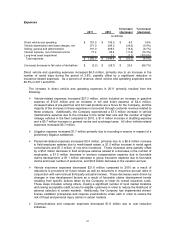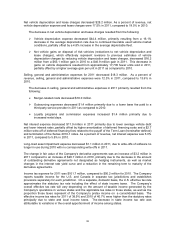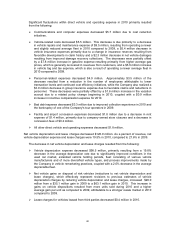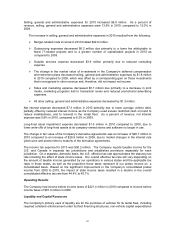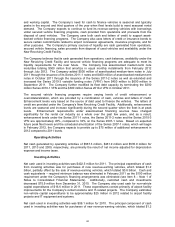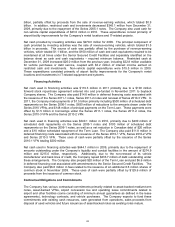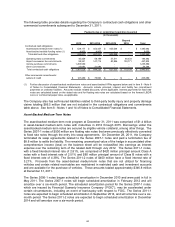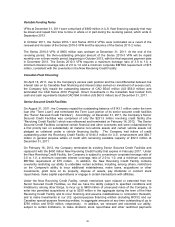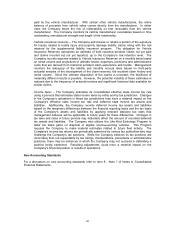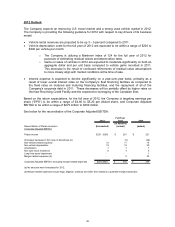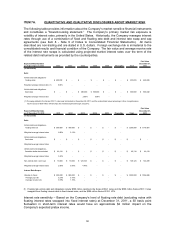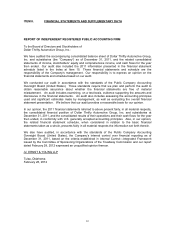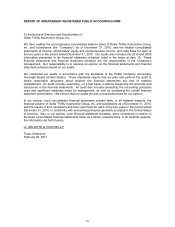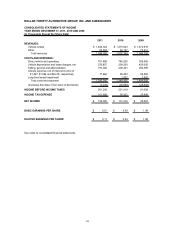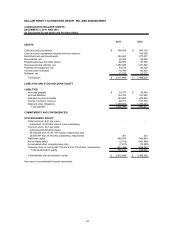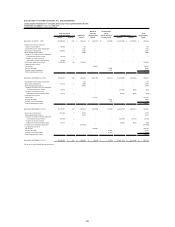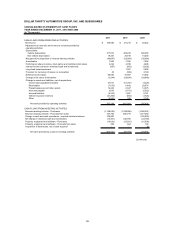Thrifty Car Rental 2011 Annual Report Download - page 48
Download and view the complete annual report
Please find page 48 of the 2011 Thrifty Car Rental annual report below. You can navigate through the pages in the report by either clicking on the pages listed below, or by using the keyword search tool below to find specific information within the annual report.under the New Revolving Credit Facility, in an amount up to $300 million, plus 50% of cumulative
adjusted net income (or minus 100% of cumulative adjusted net loss, as applicable) for the period
beginning January 1, 2012 and ending on the last day of the fiscal quarter immediately preceding the
restricted payment.
Covenant Compliance
The Company was in compliance with all covenants under its financing arrangements as of
December 31, 2011.
Debt Servicing Requirements
The Company will continue to have substantial debt and debt service requirements under its
financing arrangements. As of December 31, 2011, the Company’s consolidated funded debt and
other obligations totaled approximately $1.4 billion, all of which was secured debt for the purchase of
vehicles. All of the Company’s vehicle debt is issued by special purpose finance entities as
described herein, all of which are fully consolidated into the Company’s financial statements. The
Company has scheduled annual principal payments for vehicle debt of $500 million in 2012, $400
million in 2014 and $500 million in 2015.
The Company intends to use existing cash resources and cash generated from operations to fund
non-vehicle capital expenditures, subject to restrictions under its debt instruments, and existing cash
resources, cash generated from operations and proceeds from the sale of vehicles for debt service
and vehicle purchases. The Company has historically repaid its debt and funded its capital
investments (aside from growth in its rental fleet) with cash provided from operations and from the
sale of vehicles. The Company has funded growth in its rental fleet by incurring additional secured
vehicle debt and with cash generated from operations.
The Company has significant requirements for bonds and letters of credit to support its insurance
programs, airport concession and other obligations. At December 31, 2011, various insurance
companies had issued $47.4 million in surety bonds and various banks had issued $58.8 million in
letters of credit (primarily under the Senior Secured Credit Facilities) to secure these obligations. At
December 31, 2011, these surety bonds and letters of credit had not been drawn upon.
Interest Rate Risk
The Company’s results of operations depend significantly on prevailing interest rates because of the
large amount of debt it incurs to purchase vehicles. In addition, the Company is exposed to
increases in interest rates because a portion of its debt bears interest at floating rates. The Company
estimates that, in 2012, approximately 40% of its average debt will bear interest at floating rates.
See Item 8 - Note 8 of Notes to Consolidated Financial Statements.
Like-Kind Exchange and Tax Programs
The Company utilizes a like-kind exchange program for its vehicles whereby tax basis gains on
disposal of eligible revenue-earning vehicles are deferred (the “Like-Kind Exchange Program”). To
qualify for Like-Kind Exchange Program treatment, the Company exchanges (through a qualified
intermediary) vehicles being disposed of with vehicles being purchased allowing the Company to
carry-over the tax basis of vehicles sold to replacement vehicles, with certain adjustments. The
Company’s ability to defer the gains on the disposition of its vehicles under its Like-Kind Exchange
Program is affected by, among other things, changes in the Company’s investment in rental fleet.
Projection of the results under the Like-Kind Exchange Program is complex, requires numerous
assumptions and is not subject to precise estimation. Actual results depend upon future sale and
purchase transactions extending up to 180 days after year-end and actual results may differ from
current projections. The Company’s ability to continue to defer the reversal of prior period tax
deferrals will depend on a number of factors, including the size of the Company’s fleet, as well as the
46



